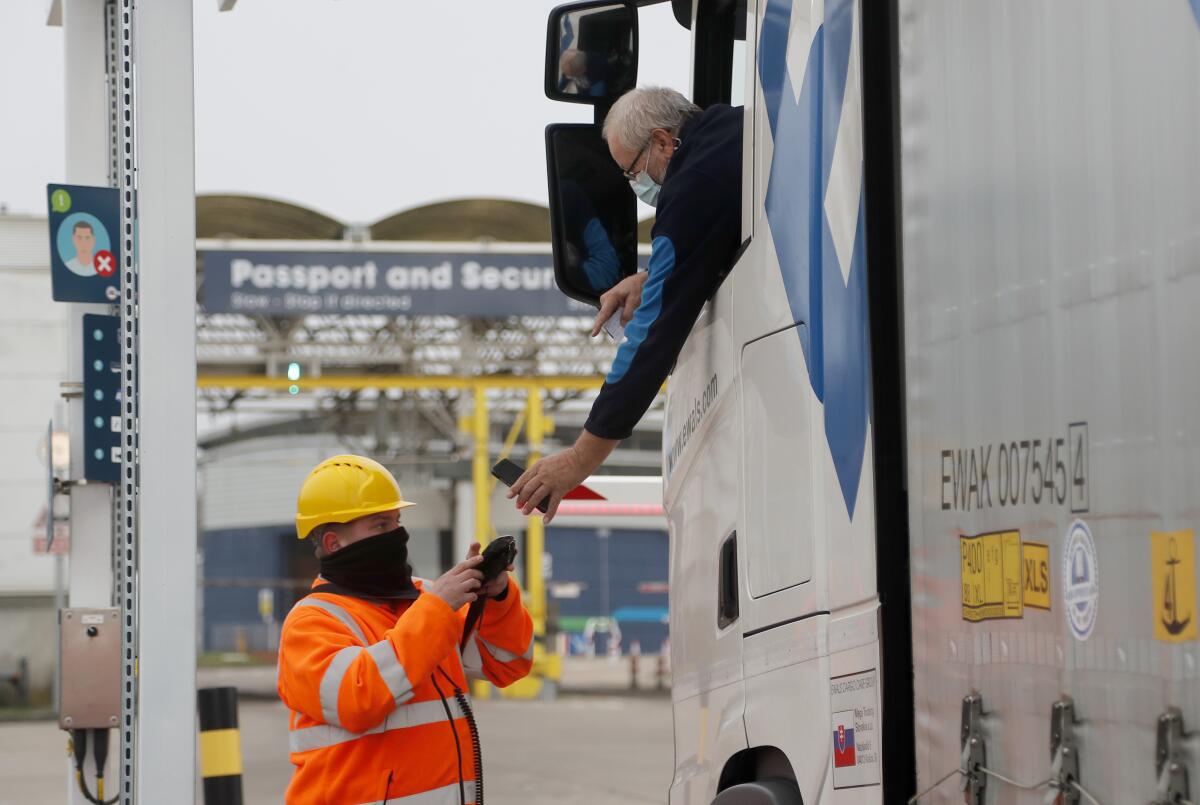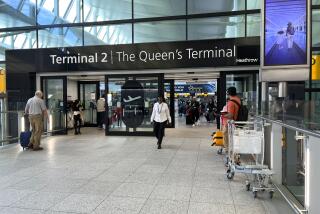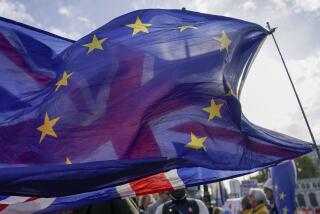A month on, post-Brexit ‘teething problems’ hit trade between UK and EU

- Share via
LONDON — One month after Britain made a New Year split from the European Union’s economic embrace, businesses that once traded freely are getting used to frustrating checks, delays and red tape.
British meat exporters say shipments have rotted in trucks awaiting European health checks. Scottish fishermen have protested at Parliament over the catch they can no longer sell to the continent because of complex new paperwork.
The manufacturers’ organization Make U.K. said Monday that 60% of manufacturing companies have experienced “significant disruption” since Jan. 1.
The British government says the troubles are “teething problems,” but companies say they are causing serious pain.
“A teething problem is something that will go away eventually,” said Alan Russell, who runs plant retailer Trees Online. New customs rules and health checks have prompted him to stop shipping to the EU and to Northern Ireland, which is part of the U.K. but remains in the bloc’s economic orbit because it shares a border with EU member Ireland.
“It’s 5 or 10% of my business I have just lost overnight,” Russell said. “I’m used to a little bit of unpredictability … but this is without doubt the most severe and unpredictable event that I can’t do anything about.”
Britain left the EU politically a year ago and quit the bloc’s single market and customs union at the end of 2020. A post-Brexit U.K.-EU trade deal means goods can still move without tariffs or quotas, but businesses face new costs, paperwork and barriers. Though many firms prepared as best they could, details of the new arrangements were not nailed down until the trade deal was sealed Dec. 24, just over a week before it took effect.
The British government is accentuating the positive. U.K. supermarkets have not run short of food, in part due to businesses stockpiling against uncertainty caused by Brexit and the coronavirus pandemic. Traffic jams have not piled up at English Channel ports, and the government says its “reasonable worst-case scenario” of 7,000-truck tailbacks is now unlikely.
Cross-channel traffic is flowing relatively smoothly, with less than 5% of trucks being turned back because drivers lack the correct paperwork, the government says.
Business groups say that’s because some companies are simply staying away. The flow of goods is only about three-quarters of its January 2020 level, and Make U.K. says many firms have “put a hold on importing and exporting from the EU in a hope that things improve.”
While many British businesses expected hurdles to trade with the EU, those that ship to Northern Ireland from other parts of the U.K. have found they also face new customs and veterinary checks as part of measures to maintain an open border between Northern Ireland and the Irish Republic to the south.
An open Irish border, free of checks on goods or people, has played a major role in building peace in the region. The sensitivity of the issue was underscored last week, when the EU threatened to ban shipments of COVID-19 vaccines to Northern Ireland as part of moves to shore up the bloc’s supply. That would have drawn a hard border on the island of Ireland — exactly the scenario the Brexit deal was crafted to avoid. British, Irish and Northern Ireland politicians all expressed alarm at the plan, and the EU dropped the idea.
U.K. business groups say firms need more support to overcome post-Brexit hurdles. Make U.K. urged the British government and the EU to simplify customs paperwork and to cut “rules of origin” red tape that has left businesses struggling to prove their goods are British and thus eligible for tariff-free trade.
The British government says it is spending millions to help companies adjust. But it also says some of the new trade friction is permanent.
“We’ve always been clear that trading as a third-party country would involve processes, the similar processes that you have for trading with the United States or Japan or any other countries,” International Trade Secretary Liz Truss said Sunday.
Brexit supporters say any short-term pain will be offset by Britain’s new freedom to set its own economic agenda and strike trade deals around the world. On Monday, Britain applied to join the Comprehensive and Progressive Trans-Pacific Partnership, a trade bloc of 11 countries including Japan, Singapore, Australia, Canada and Mexico.
Critics note Britain’s $152 billion in annual trade with the Pacific bloc is a fraction of the $920 billion a year in trade between the U.K. and the EU.
Trade expert David Henig of the European Center for International Political Economy said the British government was not leveling with people.
“They are saying ‘teething problems’ when it is actually a permanent economic shift,” he said. “Certain things are just going to become a lot harder.
“It’s a long-term economic adjustment that this is leading to.”
More to Read
Sign up for Essential California
The most important California stories and recommendations in your inbox every morning.
You may occasionally receive promotional content from the Los Angeles Times.










